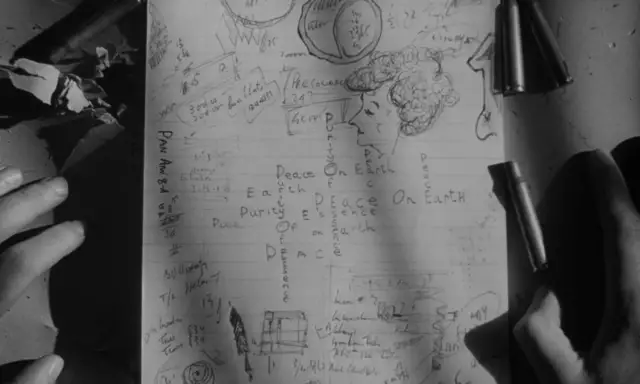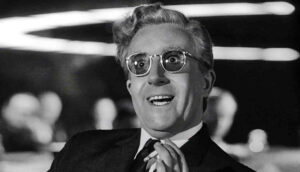The Cold-War period (1947-1991) between America and the USSR has been heavily documented in various media over the years. It was an extremely tense political situation, in which nuclear warfare was the imminent catalyst and fear. Citizens of both nations were consistently paranoid about the activities of the other, leading to a battle to achieve superiority at all costs.
Dr. Strangelove or: How I Learned to Stop Worrying and Love the Bomb (1964), directed and co-written by Stanley Kubrick, does an excellent job of subverting these extreme tensions and revealing the absurdity of the Cold-War through satire. It came at a time when the threat of nuclear holocaust was very real and fresh in the public’s mind from the Cuban Missile Crisis. The plot follows an American General’s decision to fire nuclear weaponry into Soviet territory, unbeknownst to the President of the home country. The progression deals with how the multiple stakeholders in this absurd situation cope to avert the impending crisis.
Read: 2001 A Space Odyssey Explained | Stanley Kubrick
Before delving into the film’s analysis, parallels can be drawn between the protagonists of the film and the actual dynamics of world politics.
1) General Ripper – The manifestation of a tyrannical and violence-adopting leader, representative of the deeply religious and bigoted citizens of American society in this era. General Turgidson is almost a complementary character to Ripper. Except that while the former represents the country’s hateful Americans, the latter expresses the citizens that live in deep-seated paranoia.
2) Mandrake – A British liaison officer, that comes across as a consistent voice of reason amongst increasing absurdity (audience perspective). His inability/unwillingness to assist General Ripper is representative of post-colonial British sentiment.
3) President – The President of the United States is a man who does not expressly desire war, but is so deeply riddled and caught between diplomacy and maintaining foreign relations and putting up a good image; a victim of an established political system despite being at its zenith.
4) Dr. Strangelove – A former Nazi, now American citizen, who works as a scientist for American missile research. His character seems to be derived from ‘Operation Paperclip’ in which the U.S. recruited German scientists after World War II. However, his frenzied right-hand gestures show he has not been able to completely adapt while dismissing his past beliefs.
5) Major Kong – The pilot of the B-52 that is air-borne in Soviet territory. His undying patriotism and heavy Texas accent, aided by consistent misinformation from the State’s ‘leaders’, is symbolic of the average Christian-American male and their internalized xenophobia.
Masculinity
The film is, undoubtedly, inundated with numerous sexually suggestive images. From phallic symbols such as huge missiles and long cigars, to extended discussions surrounding virility and the nature of monogamy. A central theme of the concept of ‘masculinity’ is on full-display and critique by Kubrick. Even the names of characters have sexual innuendos. For instance, mandrake being both a plant and a medicine with mythical fertility properties for women.
Turgidson tells his secretary that he would marry her someday, but his hypocrisy is seen when he gets excited about the prospect of having a ten-women to one-man ratio in mine shafts, revealing his distaste for non-monogamous relationships. General Ripper blames his inability to sexually perform to fluoridation of water by the Russian “commies”. He conveniently links his sexual incapability to his indoctrinated bigoted beliefs. The ‘precious bodily fluids’ he keeps referring to, are a dual metaphor. Firstly, it refers to contaminated semen causing erectile dysfunction. On the other hand, it is the idea of Russians being an inferior race, thereby ‘polluting’ the pure American breed.

General Kong’s final moment in the film is also notable. While the shot can be taken at face-value, the last image of him plummeting to his death while riding the nuclear missile, akin to an ecstatic cowboy with a massive erection, seems to indicate a deeper subtext and critique of the extent to which crazed masculinity can cause chaos. Also, his introduction in the film, is being caught reading a ‘Playboy’ magazine.
Inefficiencies of Bureaucracy
Kubrick’s most scathing assessment thematically in the film (arguably) is that of the incessant inefficiencies that exist within political frameworks. Concepts such as chain of command, concentration of power with individuals, and even selective dissemination of information are heavily satirized, and the jokes work because they are embedded in truth. It is something which was true for the Cold-War era, but unfortunately the idea persists even in modern society.
The first instance of this is shown when Turgidson’s secretary acts as an intermediary between Turgidson and ‘Freddy’. It is a ridiculously lengthy and drawn out shot, and the purpose behind it is to show the unreasonable efforts needed to simply establish communication between parties. What should have been a quick chat between two generals regarding matters of national importance, ends up being treated as frivolous and cumbersome transfer of information.
The aforementioned concept of selective dissemination of information is pivotal and portrayed through a variety of incidents. The troops ordered to attack Burpelson Air Force Base, and even those defending it, are both equally unaware of the reason behind their actions. Due to the nature of limited information, brother officers shoot and kill each other. In a similarly saddening situation, the officers manning the nuclear planes are completely oblivious to the truth as they religiously follow orders; in fact, they believe that Washington has been bombed by the ‘Ruskies’, and their retaliation reeks of blind patriotism. Even when Mandrake is finally captured, he is stunned to discover that his captor has next to no knowledge of the situation’s seriousness.
Discussing the aspect of concentration of power, inevitably forces a discussion of the policies that have rendered the situation’s possibility itself. Referred in the film as ‘Plan R’, an exhaustive discussion between General Turgidson and the President reveals the inherent loopholes that can easily be exploited, such as is done by General Ripper, to abuse power. The policy’s inception was supposed to be a deterrent to enemy ‘sneak’ attacks – a tool to override chain of command in exceptional circumstances. In essence, a strategy created to safeguard national interests ends up doing the exact opposite.
Absurdity of War
The title ‘Peace is our Profession’ flashes across multiple shots in the film, often in comical antithesis to the shot’s actual contents. Dr. Strangelove, indubitably, critiques the absurdity of war with its choice of adopting satire. Simply beginning from the callousness with which massive magnitudes of nuclear weaponry are thrown about in conversations, a sense of disillusionment amongst the powerful elites emerges.

Traditional war films are not always endorsements of violence, but they possess many characteristics that this film completely flips on its head to capture mindless absurdity. Firstly, the idea of patriotism and sacrificing oneself for a greater cause, as is manifested in the character of Major Kong and his men, is shown to be in complete vain. He dies believing that his actions have redeemed his country. When all they have really done due to his lack of knowledge, is create global chaos. While they are trapped in their airborne vessel with a sense of fraternity, the audience is shown the massive divide between what the officers believe and what the reality is. In the same vein, while the fights are against ‘enemies’, the absurdity of this film works in such a manner that members of the same nation are seen killing each other at Ripper’s base.
In addition, the obsession different parties have with conventional ideas of gathering ‘intelligence’ and deploying ‘technology’ is satirized very well. While the world, and Russia itself, is at the brink of collapsing, their ambassador is almost reflexively clicking pictures with his fancy gadget of the ‘War Room’. Similarly, rather than prevent imminent nuclear strikes, General Turgidson is excited at the prospect of showing the blinking squares and triangles on his board to impress the President.
The Cold War between the two superpowers is so heavily satirized it is impossible to miss. Leading from discussions regarding not having any ‘gaps’, be it in the space race or the arms race, the craziness reaches its climax when Turgidson protests in anger, that America should work tirelessly to ensure no ‘mine-shaft gap’; to ensure superiority against the Soviet in preserving their race in post-nuclear times.
The portrayal of the American military in conventional war films is shown as heroic and honorable. However, Kubrick comments on the harsh reality of war, by crushing the façade of honor, showing that the upper echelons of even the military will work for self-preservation in the face of adversity, rather than ‘for the people’. The hierarchy of governmental structures display the naivety of patriotic front-men in following the ‘leaders’ and decision-makers of the nation.
Ideology Clashes
The film’s dialogue is paramount in revealing the personal interests and beliefs of Americans against their counterparts. From the film’s very initial lines, it is established that characters such as General Ripper and Turgidson harbor a deep disdain for the communist ideology, and the atheistic belief of Russians. Their difference in political and religious ideologies are shown as cause enough for pure hatred. This comments on how deep-seated beliefs, and an inability to coexist with individuals with differing ideologies, are quite often pivotal in creating feelings of hatred amongst communities. As Mandrake discovers in the latter half of the film, the codes needed to recall the nuclear attack had the initials ‘POE’ denoting Purity of Essence or Peace on Earth, which is a manifestation of the General Ripper’s anti-Soviet beliefs.

This ties in with a section of the introduction, when discussing the ‘rites of passage’ amongst protagonists. Kubrick’s film is unique in this respect. Every single character and his beliefs in the beginning, remain completely unchanged by the end of the film. Escalating from political harmony to global catastrophe seems to not be enough to institute even minor changes in the characters’ worldviews. Ripper and Kong, for instance, possessed such extreme beliefs that they were uncompromising in their efforts to annihilate the ‘enemy’; so much so, that they both killed themselves believing in their cause.
The ideas of communism versus capitalism are also deeply prevalent both in the film and in the realistic social political setting of the era. But the film does a smart job of showcasing America’s penchant for interfering in the matters of other nations and mass proliferation of weapons, while the Soviet were insistent on expanding their communist ideologies geographically.
Conclusion
The reason behind choosing this film was two-fold. Firstly, the film is an unconventional, intriguing take on the genre of war, expressed through its use of satire. Secondly, it relates to many conventional tropes and makes the characters accessible to the audience, while doing a great job of subverting their values to explore the zeitgeist’s societal psyche. The film strikes a fine balance between entertainment and advocacy whilst being ahead of its times as it falls into Henri Focillon’s baroque/self-reflexive category of films. It is, undoubtedly, an auteur at the peak of his prowess; Kubrick engagingly uses character flaws to symbolize and scathingly criticize the institutions that those characters represent.
Watch Dr. Strangelove on Amazon
Recommended: 100 Best Hollywood Movies Of All Time

